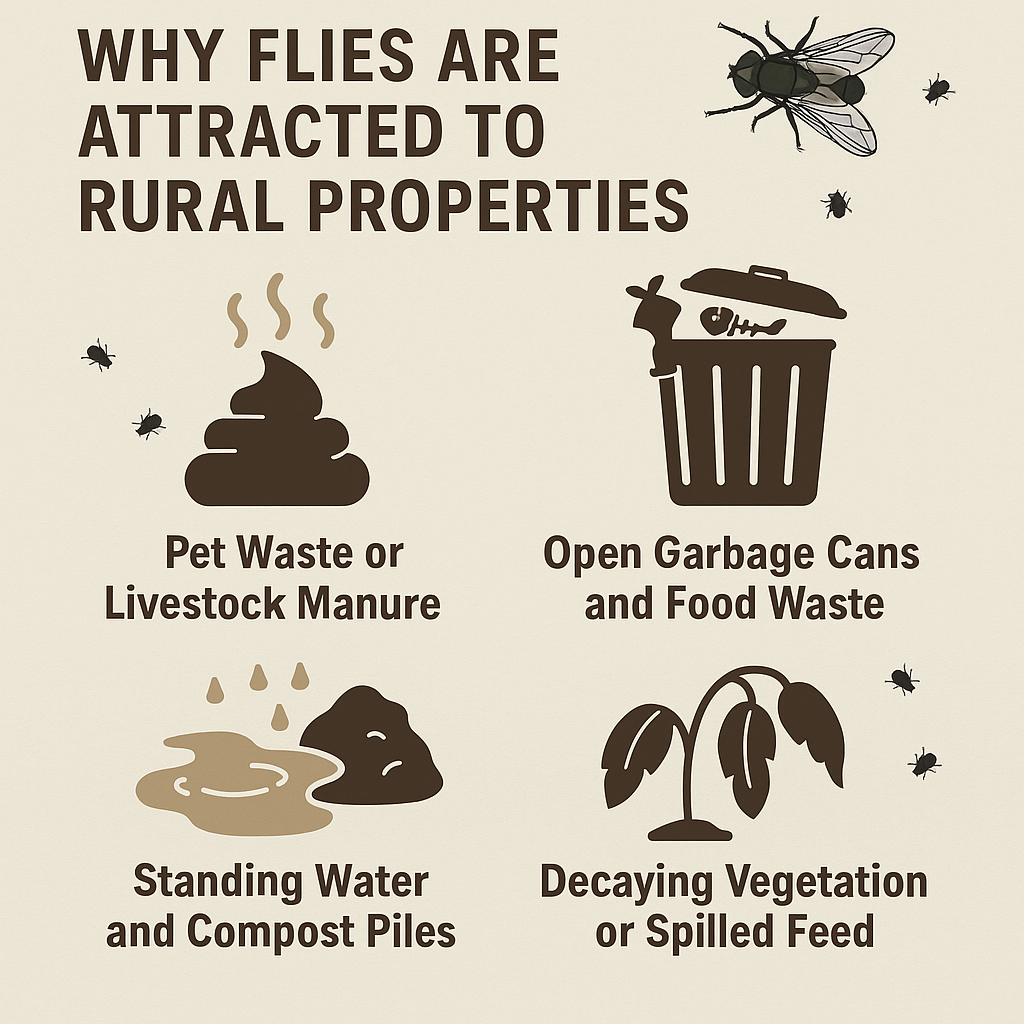How Do You Get Rid of Flies Outdoors?
Owning land in Utah means fresh air, open space, and beautiful views, but it also means dealing with nature’s less pleasant side, including flies. These pests can quickly become a problem around camp setups, livestock areas, and outdoor dining spaces. If you’re trying to figure out how to get rid of flies outdoors, the best approach combines cleanliness, natural deterrents, and simple outdoor fly control strategies designed for rural properties.
Why Flies Are Attracted to Rural Properties
Flies are drawn to almost any organic material they can feed or breed in. On rural land, that often means manure, waste, food scraps, and even damp soil. Because they multiply quickly, one small problem area can lead to a full infestation if not managed consistently. The good news is that most fly issues can be prevented through simple property upkeep. Start by identifying what could be attracting them.
Common fly attractants include:
Pet waste, livestock manure, or decaying vegetation
Open garbage cans or food waste left outdoors
Standing water around troughs or buckets
Compost piles that aren’t turned regularly
Spilled animal feed or fermented grass clippings
Flies breed in moisture and thrive in heat, so the cleaner and drier your property is, the fewer problems you’ll have. Regularly removing waste and sealing containers can cut down on fly activity almost immediately.
Natural Ways to Repel Flies Outdoors
If you prefer to avoid chemical sprays, several natural fly control methods are effective, affordable, and safe for use around families and livestock. These repellents rely on scent, plant oils, and natural attractant traps to discourage flies without harming the environment. The goal is to make your outdoor areas less appealing to them while still keeping your land healthy and balanced.
Some natural ways to keep flies away include:
Essential oils: Strong scents like eucalyptus, lemongrass, lavender, and peppermint repel flies. Mix with water in a spray bottle and apply to outdoor tables, seating areas, or near animal pens.
Herbal plants: Planting basil, mint, marigolds, or rosemary around outdoor kitchens, fire pits, or porches naturally keeps flies at a distance.
Apple cider vinegar trap: Pour vinegar into a jar, add a drop of dish soap, and cover it with plastic wrap with small holes. The smell attracts flies, but they can’t escape once inside.
These natural fly repellents are safe for outdoor living spaces and blend well with Utah’s dry, sunny climate, where keeping things natural and low-maintenance often works best.
Best Outdoor Fly Control for Large Properties
If you own several acres, controlling flies across open ground can seem like a never-ending battle. However, fly populations grow fastest in specific areas—manure piles, food waste zones, and damp compost. By targeting these hot spots, you can make a big difference across your whole property. Consistent maintenance and simple prevention habits are key to keeping flies away long term.
Effective outdoor fly control steps include:
Clean up animal waste daily and remove it far from living areas.
Keep garbage bins covered and rinse them weekly to eliminate residue.
Store feed and grain in sealed containers to prevent odor.
Turn compost piles often and add dry materials to prevent odor buildup.
Eliminate standing water or mud that attracts flies and mosquitoes.
Fly control is an ongoing process, but rural landowners who stay proactive will notice fewer pests each season. Clean, organized spaces make your land not only more comfortable but also more welcoming for guests and wildlife.
Using Fly Traps, Barriers, and Devices
Even with good property management, you’ll likely still see a few flies, especially during hot summer months. For that reason, adding physical fly deterrents provides a second layer of protection. These tools are simple, inexpensive, and can make a noticeable difference during outdoor meals, gatherings, or workdays.
Here are a few helpful outdoor fly deterrents:
Fly traps: Hang disposable fly bags or sticky traps around barns, garbage areas, or fences. Place them away from food or seating areas.
Outdoor fans: Flies can’t fly well against airflow. Setting up oscillating fans on porches or patios keeps them away naturally.
Screened spaces: Installing mesh screens on gazebos, RV setups, or porches lets you enjoy the outdoors without the hassle of bugs.
Bug zappers: Electric or solar zappers help reduce populations in open areas where flies gather at dusk.
Combining these devices with regular cleaning and natural repellents provides the best long-term fly prevention strategy for Utah’s rural environment.
Long-Term Fly Prevention Tips for Utah Landowners
Keeping flies away isn’t just about quick fixes, it’s about long-term land management. Rural fly control depends on staying consistent with cleaning, moisture control, and landscaping choices. Flies are opportunists, so if one food source disappears, they’ll search for another. The more proactive you are, the easier it is to keep your outdoor spaces enjoyable year-round.
Long-term fly prevention strategies include:
Schedule routine cleanups of animal areas and garbage sites.
Inspect after storms to ensure there’s no standing water.
Plant herbs and flowers that naturally repel insects.
Rotate compost piles and balance “green” and “brown” materials.
Keep livestock feed dry and stored indoors when possible.
With consistent care, your land will stay fresh, comfortable, and more enjoyable for family gatherings, camping, or simply spending time outdoors without swatting flies.
Final Thoughts on How to Get Rid of Flies Outdoors
Getting rid of flies outdoors doesn’t require expensive products or constant frustration. Most of the work comes down to regular maintenance, smart prevention, and adding a few helpful deterrents around your property. By using a mix of natural repellents, physical barriers, and good sanitation habits, you can enjoy cleaner air, healthier animals, and a much more peaceful outdoor environment.
Utah landowners know the beauty of country living, and with the right fly control strategy, you can keep your property as comfortable as it is scenic.


